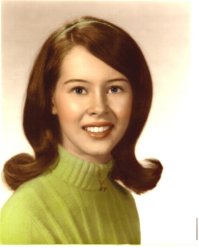|
|
 July
31, 2000: July
31, 2000:
|
 |
Thirty-one years ago today, in the basement
of our parish church, I met the girl at left, who took a chance on a very
random kid, thereby changing his life forever. This photo was taken just
a couple of months before, when she was still only 15. We married seven
years later, in October, 1976.
My devotion to Carol Ostruska Duntemann is well known. Our trick? We were
friends before we were lovers, and we became and remained best friends in
the face of all the world could throw at us. So we will remain, as long
as we will live—and maybe longer.
|
 July
29, 2000: July
29, 2000:
|
So Napster gets a reprieve from the injunction
intended to shut it down. I think at this juncture that the recording
industry should meditate on the unwelcome fact that Napster is its
last chance. I took a look at some of the file-swapping mechanisms
warming up in the bullpen, and however bad Napster may seem to the record
moguls, everything else is way worse. Think of it this way: Napster
is "shaped" like a business. The prices are all zero, but that's
less important than the way things are arranged. If the record guys chose
to, they could work with Napster (or even buy it) and evolve it
to become the ultimate online song store. Gnutella, on the other hand
(which I've tried) and FreeNet (which I haven't tried) are shaped nothing
at all like a business. Furthermore, they are by nature uncontrollable,
and if they catch hold in the next year or so, the music industry as we
know it is over.
The record honchos are in a bad spot, and in some respects I sympathize
with them. Secure audio content is impossible without retiring the current
audio CD format, which is just as impossible. As long as CDs are issued
that can be played on hundreds of millions of stereo systems, there will
be "free" music floating around the Net. But without physical
CDs (and the record stores to sell them) we don't have an industry.
This may not be an altogether bad thing. The current winner-takes-all
system is completely unfair to small bands, who can make their own CDs
but can't get them into distribution. All the money flows to a handful
of bands, with the record labels taking their cuts. Interestingly, what
might be the outcome of all this is that indie bands might sell individual
tracks that are protected somehow (or at least steganographically "watermarked")
and never shipped on standard physical CDs. If they make them cheap enough
(and I'm suggesting a quarter per, truly!) they'll sell plenty, especially
if they work out some sort of deals with specialty webcasters. And yes,
any protection scheme will be broken, but I'm not sure that with sufficiently
cheap music, people will even bother. make it cheap, make it easy, and
the money will come.
The days of the horizontal-appeal, mega-rich mega-star may be numbered.
Maybe that means that my kind of music (typefied by bands like the
Tokens, the Association, and the Peppermint Trolley Company, and folkers
like David Buskin) might be able to get some play, and even some money.
Let us pray.
|
 July 28, 2000:
July 28, 2000:
|
 For
the last couple of years I have heard that USB support under Windows NT
was just plain impossible, though nobody ever managed to get across why
this had to be so. (Mysterious complications in the network layer or something,
yeah, right.) So I was floored to discver that the HP PhotoSmart S20 slide
scanner is a USB peripheral that can be installed under NT4 on machines
that have the USB hardware. I picked one up today and had it installed
in ten minutes. There was nothing rabidly difficult about it, although
I had to download the drivers and install them, and the instructions on
HP's Web site were just plain...wrong. (Use your head and you can figger
it out, tho.) For
the last couple of years I have heard that USB support under Windows NT
was just plain impossible, though nobody ever managed to get across why
this had to be so. (Mysterious complications in the network layer or something,
yeah, right.) So I was floored to discver that the HP PhotoSmart S20 slide
scanner is a USB peripheral that can be installed under NT4 on machines
that have the USB hardware. I picked one up today and had it installed
in ten minutes. There was nothing rabidly difficult about it, although
I had to download the drivers and install them, and the instructions on
HP's Web site were just plain...wrong. (Use your head and you can figger
it out, tho.)
The scanner works very well, and I had a bad need for it: My father took
a huge number of 35mm slides over a 30 year period, and we have
no easy way to look at them anymore. The photo at left is typical, of
my sister Gretchen and me in the summer of 1960. Resolution and quality
are extremely high, although it takes about fifteen seconds per slide
to get a finished scan. The unit comes with software for correcting color
(something I could really use on older slides) but I haven't mastered
it yet.
My intent is to get them all onto a CD, so family members can have them
all without needing a Carousel projector or one of those screwy roll-down
screens. Highly recommended!
|
 July 27, 2000:
July 27, 2000:
|
I
heard this morning that the RIAA finally succeeded in getting an injunction
against Napster. So I cranked it up one last time and took a look around,
just to remember what the phenom was like before it shuts down (I would
guess for good) this Friday. Although I'm no fan of the RIAA, Napster was
clearly on the other side of ethical practice. And I find it interesting
that there was a great deal more interesting music when I last looked, back
sometime in mid-May of this year. Oldies and classical were much
more prevalent back in May. Why? All I can figure is that the RIAA's scare/guilt
campaign worked, but only on people like me. The people who like Metallica
and Dr. Dre stuck with it. Old guys like me bailed. This says something
about something, but don't ask me what.
|
 July 26, 2000:
July 26, 2000:
|
After
more than a year of rewriting and polishing, I'm sending The Cunning
Blood off to Time-Warner Aspect today. This is the SF novel I began
in late summer 1997, and finished on Good Friday 1999. My original title
was No Way In Hell, but I heard on good authority that certain bookstores
won't shelve a book with the word "hell" in the title, regardless
of its context. (Here, it's the name of a planet.) Hell, (as it were) why
kill chaces for additional sales, however slim? Besides, the main character
in the story is a distributed nanocomputer consisting of hundreds of millions
of bacteria-sized nanomachines that live in the human bloodstream. It's
hard SF in the grand tradition: gadgets, action, interesting places and
ideas. If you ever enjoyed Larry Niven you'd like it. It sounds a little
odd for a veteran author and publisher not to able to find a publisher for
a completed and polished book, but the wall between genres is light years
high. My computer books count for nothing in the SF world, alas. Hey, I'll
post a chapter or two here one of these days. Watch for it, and bug me if
you don't see it in another month or so.
|
 July 25, 2000:
July 25, 2000:
|
I've been wanting to get a Web
diary back in play for eight or nine months now, ever since it was clear
that Visual Developer Magazine was sinking, and VDM Diary
sinking with it. I decided to set the idea aside until I was ready to
completely reconstruct my personal page, using Dreamweaver 3.0. Finally,
I've had the time to sit down and get familiar enough with Dreamweaver
to put a "homely" diary format in place. I'm no artist, but Dreamweaver
allows me to do about as good a job as any plodding technician can do.
As I learn, the format will improve. I hope.
|